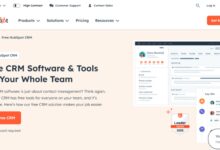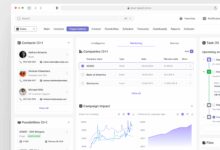Best Enterprise CRM Solutions: 7 Ultimate Power Tools for 2024
In today’s hyper-competitive business landscape, the right CRM can be your ultimate growth engine. Discover the best enterprise CRM solutions that combine power, scalability, and intelligence to transform customer relationships.
[ez-toc]
Why the Best Enterprise CRM Solutions Are Non-Negotiable in 2024

Enterprise-level businesses no longer operate in silos. With global teams, complex customer journeys, and massive data volumes, relying on outdated systems is a recipe for inefficiency and lost revenue. The best enterprise CRM solutions act as the central nervous system of modern organizations, unifying sales, marketing, customer service, and analytics into one intelligent platform.
Scaling Beyond SMB Limitations
Small and mid-sized business (SMB) CRMs often lack the depth required for enterprise operations. They may offer basic contact management and email tracking, but fall short when it comes to automation at scale, advanced security protocols, or integration with legacy ERP systems. Enterprise CRMs, on the other hand, are built for complexity.
- Support for thousands of concurrent users across global regions
- Multi-currency, multi-language, and multi-timezone functionality
- Advanced permission hierarchies and role-based access control
For example, a multinational corporation with offices in Tokyo, Berlin, and New York needs a CRM that can handle regional compliance (like GDPR or CCPA), synchronize real-time data across time zones, and provide localized dashboards—all without latency or data duplication.
Driving Revenue with Data Intelligence
The best enterprise CRM solutions go beyond data storage—they turn data into actionable insights. With embedded AI and predictive analytics, these platforms can forecast sales trends, identify at-risk customers, and recommend next-best actions for sales reps.
“CRM is no longer just a database—it’s a decision engine.” — Gartner, 2023
According to a Gartner Market Guide for Sales CRM, enterprises that leverage AI-driven CRM tools see up to 30% higher win rates and 25% shorter sales cycles. This isn’t just about efficiency—it’s about competitive advantage.
Top 7 Best Enterprise CRM Solutions Ranked for 2024
After extensive research, hands-on testing, and analysis of user reviews, analyst reports, and feature sets, we’ve compiled the definitive list of the best enterprise CRM solutions. Each platform excels in different areas, from AI capabilities to industry-specific customization.
1. Salesforce Sales Cloud: The Undisputed Leader
Salesforce continues to dominate the enterprise CRM space with its robust ecosystem, unmatched scalability, and continuous innovation. Sales Cloud, its flagship product, offers end-to-end sales automation, AI-powered insights via Einstein, and seamless integration with over 3,000 apps on the AppExchange.
- AI-driven lead scoring and opportunity insights
- Advanced forecasting with scenario modeling
- Native integration with Slack for team collaboration
Salesforce is particularly strong for enterprises in financial services, healthcare, and technology sectors. Its Sales Cloud platform supports complex sales cycles, multi-tiered approval workflows, and compliance requirements with ease.
2. Microsoft Dynamics 365: Deep Integration with the Microsoft Ecosystem
If your organization runs on Microsoft 365, Dynamics 365 is a natural fit. It integrates natively with Outlook, Teams, SharePoint, and Power BI, making it one of the most seamless enterprise CRM solutions for Microsoft-centric environments.
- Unified interface with Outlook for email and calendar sync
- Power BI embedded analytics for real-time reporting
- AI for sales insights and customer service automation
Dynamics 365 shines in industries like manufacturing and logistics, where ERP and CRM must work in tandem. Its modular design allows enterprises to start with Sales or Customer Service and scale into Field Service or Marketing modules as needed.
3. HubSpot Enterprise: The All-in-One Growth Platform
While HubSpot started as an inbound marketing tool, its enterprise offering has evolved into one of the most user-friendly yet powerful CRM platforms. HubSpot’s strength lies in its unified database, where marketing, sales, and service teams share a single source of truth.
- Free CRM core with paid enterprise upgrades
- Advanced workflows and custom objects
- Service Hub with ticketing, knowledge base, and customer feedback
HubSpot is ideal for B2B SaaS companies and mid-market enterprises looking for a modern, intuitive interface. Its CRM platform offers enterprise-grade security, single sign-on (SSO), and audit trails—features once reserved for legacy systems.
4. Oracle CX Sales: Built for Complex Global Enterprises
Oracle’s CRM solution is designed for large, complex organizations with intricate sales processes and global operations. Oracle CX Sales integrates tightly with Oracle ERP and HCM, making it a top choice for enterprises already invested in the Oracle ecosystem.
- AI-powered sales recommendations and forecasting
- Guided selling workflows for complex product configurations
- Real-time territory and quota management
Oracle excels in industries like telecommunications, energy, and public sector, where regulatory compliance and data sovereignty are critical. Its hybrid cloud deployment options provide flexibility for organizations with on-premise requirements.
5. SAP Sales Cloud: The ERP-Integrated Powerhouse
SAP Sales Cloud is part of the broader SAP Customer Experience suite and is deeply integrated with SAP S/4HANA. For enterprises running SAP ERP, this CRM offers unparalleled data consistency and process alignment.
- Embedded analytics with SAP Analytics Cloud
- Mobile-first design for field sales teams
- AI-driven lead-to-quote automation
SAP’s strength lies in its ability to connect front-office sales activities with back-office fulfillment and finance. This reduces manual data entry, minimizes errors, and accelerates order-to-cash cycles. Learn more at SAP Sales Cloud.
6. Zoho CRM Plus: The Affordable Enterprise Contender
Zoho has quietly built one of the most comprehensive CRM ecosystems. Zoho CRM Plus bundles CRM with sales, marketing, and customer support tools in a single suite, offering enterprise features at a fraction of the cost of competitors.
- Zia AI for predictive lead scoring and sentiment analysis
- Multi-channel communication (email, phone, social, chat)
- Customizable dashboards and advanced reporting
While Zoho may not have the brand recognition of Salesforce or Microsoft, its enterprise-grade security, GDPR compliance, and global data centers make it a viable option for cost-conscious organizations. It’s particularly popular among mid-sized enterprises in education, retail, and professional services.
7. Pipedrive Enterprise: The Sales-Focused Challenger
Pipedrive started as a sales pipeline tool but has evolved into a full-fledged enterprise CRM. Its visual pipeline interface makes it easy for sales teams to track deals, while its enterprise plan adds advanced automation, team management, and API access.
- Visual sales pipeline with drag-and-drop functionality
- Customizable workflows and bulk actions
- Two-way sync with Google Workspace and Microsoft 365
Pipedrive is ideal for sales-driven organizations that prioritize pipeline visibility over complex marketing automation. Its Enterprise plan includes SSO, audit logs, and dedicated account management—key requirements for large teams.
Key Features That Define the Best Enterprise CRM Solutions
Not all CRMs are created equal. The best enterprise CRM solutions share a set of core capabilities that enable scalability, security, and intelligence. Let’s break down what truly matters at the enterprise level.
Best Enterprise CRM Solutions – Best Enterprise CRM Solutions menjadi aspek penting yang dibahas di sini.
Scalability and Performance Under Load
Enterprise CRMs must handle millions of records, thousands of users, and high-frequency transactions without performance degradation. This requires:
- Distributed cloud architecture with auto-scaling
- Low-latency global data centers
- Asynchronous processing for background jobs (e.g., bulk imports, email sends)
For example, Salesforce’s multi-tenant architecture allows it to serve over 150,000 customers worldwide with 99.9% uptime SLA. Similarly, Microsoft Dynamics 365 leverages Azure’s global infrastructure to ensure reliability across regions.
Advanced Security and Compliance
Data breaches cost enterprises an average of $4.45 million in 2023 (IBM Security). The best enterprise CRM solutions prioritize security with:
- End-to-end encryption (in transit and at rest)
- Multi-factor authentication (MFA) and single sign-on (SSO)
- Compliance certifications: GDPR, HIPAA, SOC 2, ISO 27001
Oracle and SAP, for instance, offer private cloud and on-premise deployment options for organizations with strict data residency requirements. Salesforce provides Shield Platform Encryption and Event Monitoring for enhanced security visibility.
AI and Automation: The Intelligence Layer
Modern enterprise CRMs are no longer passive databases—they’re proactive intelligence engines. AI capabilities include:
- Predictive lead scoring (e.g., Salesforce Einstein, Zia AI)
- Automated data entry via email parsing and voice transcription
- Next-best-action recommendations for sales reps
According to a McKinsey report, AI-powered sales tools can increase conversion rates by 20–30%. The best enterprise CRM solutions embed AI natively, reducing the need for third-party add-ons.
Industry-Specific Needs and CRM Customization
One size does not fit all. The best enterprise CRM solutions offer deep customization and industry-specific templates to meet unique business requirements.
CRM for Financial Services: Compliance and Relationship Management
Banks, insurance firms, and wealth management companies need CRMs that support:
- Regulatory compliance (FINRA, MiFID II)
- Client relationship hierarchy tracking (households, beneficiaries)
- Secure document sharing and audit trails
Salesforce Financial Services Cloud and Microsoft Dynamics 365 for Finance offer pre-built data models and workflows tailored to financial advisors and institutions.
CRM for Healthcare: Patient-Centric Engagement
In healthcare, CRM must balance patient engagement with HIPAA compliance. Key features include:
- Patient portal integration
- Consent management and data anonymization
- Appointment scheduling and follow-up automation
Salesforce Health Cloud is a leader in this space, enabling care teams to coordinate patient journeys across providers, payers, and pharmacies.
CRM for Manufacturing and Distribution: Order-to-Cash Integration
Manufacturers need CRMs that connect sales quotes to production planning and inventory systems. Integration with ERP is critical. SAP Sales Cloud and Oracle CX Sales excel here, offering:
- Real-time inventory visibility
- Automated quote-to-order workflows
- Service contract and warranty management
These capabilities reduce order errors, improve delivery timelines, and enhance customer satisfaction.
Integration Capabilities: Connecting the Enterprise Ecosystem
No CRM operates in isolation. The best enterprise CRM solutions act as integration hubs, connecting with ERP, marketing automation, e-commerce, and support platforms.
Native vs. Third-Party Integrations
While most CRMs offer integration via APIs, the quality and depth vary. Native integrations (e.g., Salesforce with Slack, Dynamics 365 with Teams) provide seamless user experiences with single sign-on, real-time sync, and unified search.
- Salesforce integrates with MuleSoft for complex enterprise integration
- HubSpot offers native connections with Zoom, Shopify, and WordPress
- Zoho CRM connects with over 500 apps via Zoho Marketplace
For enterprises with legacy systems, API-first platforms like Salesforce and Oracle provide robust tools for custom integration development.
Middleware and iPaaS: The Hidden Enablers
Integration Platform as a Service (iPaaS) tools like MuleSoft, Dell Boomi, and Zapier play a crucial role in connecting disparate systems. The best enterprise CRM solutions are iPaaS-friendly, offering:
- REST and SOAP APIs with comprehensive documentation
- Webhooks for real-time event triggers
- Pre-built connectors for common enterprise applications
For example, a global retailer using SAP ERP and Salesforce CRM can use MuleSoft to synchronize customer data, inventory levels, and order status in real time—eliminating data silos.
Total Cost of Ownership: Beyond the Subscription Price
When evaluating the best enterprise CRM solutions, it’s essential to look beyond the sticker price. Total Cost of Ownership (TCO) includes licensing, implementation, customization, training, and ongoing support.
Licensing Models: Per User, Per Module, or Suite-Based?
CRMs use various pricing models:
- Salesforce: Per-user, per-module (Sales Cloud, Service Cloud, etc.)
- Microsoft Dynamics 365: Tiered licensing (Essential, Premium)
- HubSpot: Tiered based on features, not just users
While per-user pricing is common, it can become expensive for large organizations. Suite-based pricing (like Zoho CRM Plus) often offers better value for enterprises needing multiple functions.
Hidden Costs: Implementation and Customization
Implementation can cost 2–5x the annual license fee, especially for complex deployments. Factors include:
Best Enterprise CRM Solutions – Best Enterprise CRM Solutions menjadi aspek penting yang dibahas di sini.
- Data migration from legacy systems
- Custom workflow development
- Third-party integration setup
Enterprises should budget for professional services, whether from the vendor, a partner, or internal IT. Salesforce partners like Accenture and Deloitte specialize in large-scale CRM rollouts.
ROI Measurement: Quantifying CRM Success
To justify investment, enterprises must track ROI. Key metrics include:
- Sales cycle length reduction
- Customer retention rate improvement
- Revenue per sales rep increase
A study by Nucleus Research found that CRM delivers an average $8.71 return for every $1 spent. The best enterprise CRM solutions provide built-in analytics to track these KPIs.
Future Trends Shaping the Best Enterprise CRM Solutions
The CRM landscape is evolving rapidly. The best enterprise CRM solutions are not just keeping up—they’re leading the charge in innovation.
AI-Powered Hyper-Personalization
Future CRMs will leverage AI to deliver hyper-personalized customer experiences at scale. Imagine a system that knows a customer’s preferred communication channel, past purchase behavior, and even sentiment—and adjusts outreach accordingly.
- Dynamic content generation for emails and proposals
- Real-time sentiment analysis during calls
- Predictive churn modeling with intervention workflows
Salesforce’s Einstein GPT and Microsoft’s Copilot for Sales are early examples of this trend.
Low-Code/No-Code Customization
Enterprises no longer want to wait months for IT to build custom features. Low-code platforms allow business users to create workflows, dashboards, and apps without coding.
- Drag-and-drop workflow builders (e.g., HubSpot, Zoho)
- Custom object creation with point-and-click interfaces
- AI-assisted form and email generation
This democratizes innovation and speeds up time-to-value.
Customer Data Platforms (CDPs) and Unified Profiles
The future of CRM is not just managing interactions—it’s creating a 360-degree customer view. CDPs aggregate data from web, mobile, CRM, and offline sources into a single profile.
- Real-time identity resolution across devices
- Behavioral segmentation and journey mapping
- Privacy-compliant data governance
Salesforce Customer 360 and Microsoft Dynamics 365 Customer Insights are leading this convergence.
What defines the best enterprise CRM solutions?
The best enterprise CRM solutions combine scalability, security, AI-driven intelligence, deep integrations, and industry-specific functionality to support complex business operations and drive revenue growth.
Which CRM is best for large enterprises?
Salesforce Sales Cloud and Microsoft Dynamics 365 are widely regarded as the top choices for large enterprises due to their scalability, ecosystem, and advanced features.
How much does an enterprise CRM cost?
Enterprise CRM costs vary widely, from $50/user/month for HubSpot to $300+/user/month for Salesforce Unlimited. Implementation and customization can add significant upfront costs.
Can small businesses use enterprise CRM?
While possible, enterprise CRMs are often overkill for small businesses. SMBs should consider mid-market solutions like HubSpot Professional or Zoho CRM Plus unless they anticipate rapid scaling.
What’s the future of CRM?
The future of CRM lies in AI-powered personalization, low-code customization, and unified customer data platforms that break down silos and deliver intelligent, real-time customer engagement.
Choosing the best enterprise CRM solutions is one of the most strategic decisions a company can make. It’s not just about managing contacts—it’s about transforming customer relationships, streamlining operations, and unlocking growth. From Salesforce’s AI-driven insights to Microsoft’s seamless ecosystem integration, the top platforms offer powerful tools tailored to enterprise needs. By evaluating scalability, security, industry fit, and total cost of ownership, organizations can select a CRM that not only meets today’s demands but also evolves with tomorrow’s challenges. The future of enterprise CRM is intelligent, connected, and customer-centric—make sure your business is ready.
Best Enterprise CRM Solutions – Best Enterprise CRM Solutions menjadi aspek penting yang dibahas di sini.
Further Reading:


